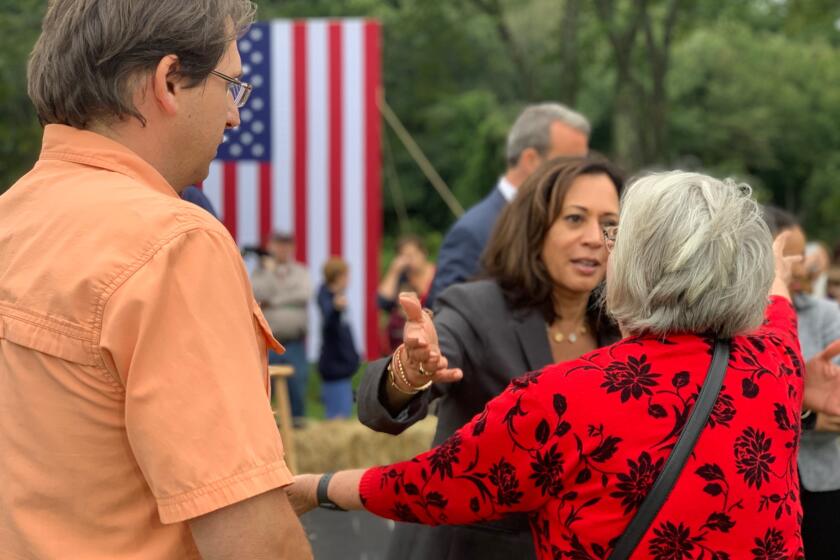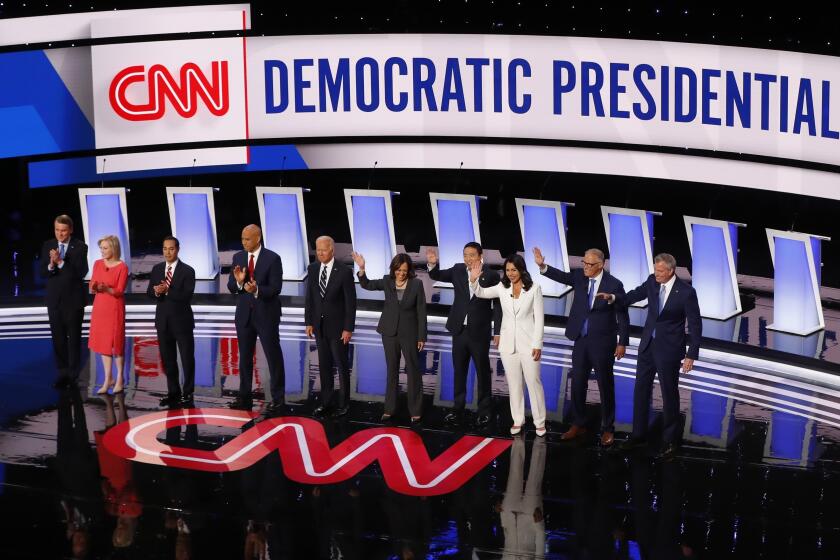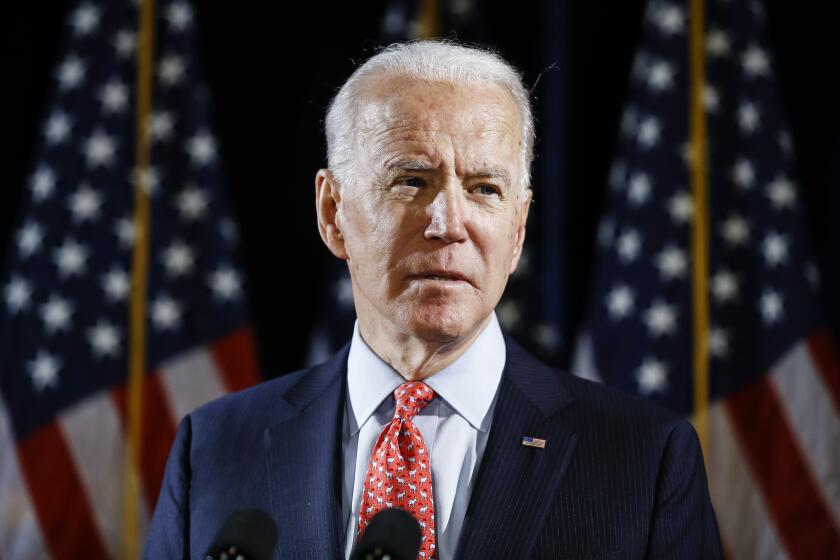‘That’s a turnoff.’ Democratic debate attacks make some primary voters cringe
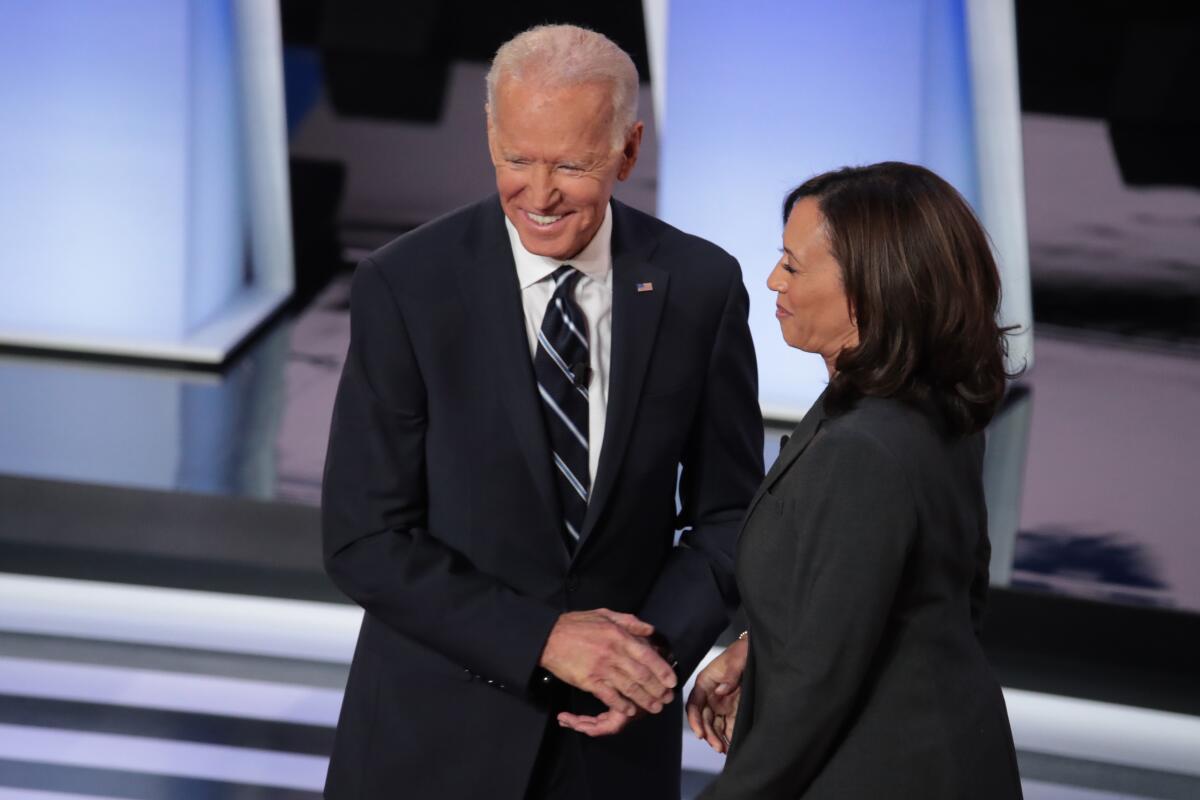
- Share via
LONDONDERRY, N.H. — When Ray Watkins watches the third Democratic presidential primary debate, he’ll do so with a twinge of trepidation.
In the last two debates, he saw his party’s candidates rip into each other over healthcare, immigration and criminal justice policy. It wasn’t a pleasant sight.
“It’s like you have your brothers and sisters fighting against each other,” said Watkins, a 46-year-old voter from Londonderry. “That’s a turnoff.”
The 10 Democratic candidates who take the stage in Houston on Thursday may see a verbal haymaker as a way to knock out a rival and claim victory in the debate. But many of their party’s primary voters dread more attacks, fearing that intraparty sparring will harm their nominee in a general election against President Trump.
That presents the presidential contenders, particularly those lagging in the polls, with a conundrum: How do you break from the pack when voters blanch at any sign of discord?
“It’s very tempting to attack people you see in your way,” said Bill Carrick, a Los Angeles-based political consultant who has worked on presidential campaigns. “I just don’t think you can get anything out of it. It helps the other people in the field more than it helps you.”
With momentum flagging, Kamala Harris is counting on Thursday’s debate and a new strategy in Iowa and New Hampshire to reenergize her campaign.
The previous debates show the potential — and peril — of going negative. California Sen. Kamala Harris turbocharged her campaign when she laced into former Vice President Joe Biden in the June debate over differences including his stance on mandatory busing in the 1970s. Her performance boosted her fundraising and propelled her momentarily in the polls. Many Democrats were captivated by the thought of Harris similarly eviscerating Trump on a debate stage.
But not everyone was enamored with her approach.
“I was disappointed in the way she attacked the top runner,” said Nick Salmon, a 74-year-old retiree from Fort Dodge, Iowa. Cheryl Hurdel, a 61-year-old Fort Dodge retiree, said the attack made Harris seem “very unpresidential.”
Other candidates put in scrappy debate performances, but saw little lasting impact on their campaigns. Former Housing Secretary Julián Castro’s jab at former Texas Rep. Beto O’Rourke over immigration policy earned him a burst of media attention after the first night of the June debate, but that was drowned out by Harris’ takedown of Biden the following evening.
Hawaii Rep. Tulsi Gabbard’s denunciation of Harris’ criminal justice record in the July debate wobbled the senator, but it wasn’t enough to secure Gabbard the support for a slot at Thursday’s event in Houston.
For those polling in the low single digits, says Democratic strategist Joe Trippi, “the only thing that’s going to get you any attention in this cycle with this many candidates is to make some kind of contrast with somebody else in the race.... Problem is, many candidates are trying to do that.”
Trippi, who managed Vermont Gov. Howard Dean’s 2004 presidential campaign, added that Trump’s ability to command the news cycle can also draw attention away.
“It’s a combination of Trump and all these candidates vying for that moment that makes it difficult to sustain that momentum,” he said.
Voters often bemoan attacks in politics, even though mudslinging has long been shown to work. But in this election cycle, anxiety over beating Trump has made rough play even more unpalatable for many Democratic voters.
The debate Thursday night will for the first time put the entire top-tier on stage together, including Joe Biden and Elizabeth Warren.
“Yes, we’ve got to debate, but we don’t want anybody tearing anybody down to the point where we look weak or we’re identifying our weaknesses for our opponent,” said Rania Jamison, an entrepreneur and activist in the African American community in Columbia, S.C. “The main thing on everybody’s mind is that we’ve got to be a united front to beat Trump.”
Jamison, 41, said candidates should be firm and forceful in making their own case, but avoid digs on fellow Democrats on stage: “People do not want them left in such disrepair that a Kamala and a Biden couldn’t work together in some regard.”
Debate formats encourage those on stage to engage each other. A candidate who singles out a rival by name helps control the topic and will often get a second opportunity to weigh in after their target responds.
The July debate, hosted by CNN in Detroit, yielded particularly sharp exchanges, often egged on by moderators.
In the first question on the first night, CNN host Jake Tapper asked Vermont Sen. Bernie Sanders about his “Medicare for all” plan — by citing former Maryland Rep. John Delaney, a minor candidate best known for his criticisms of the race’s more liberal candidates.
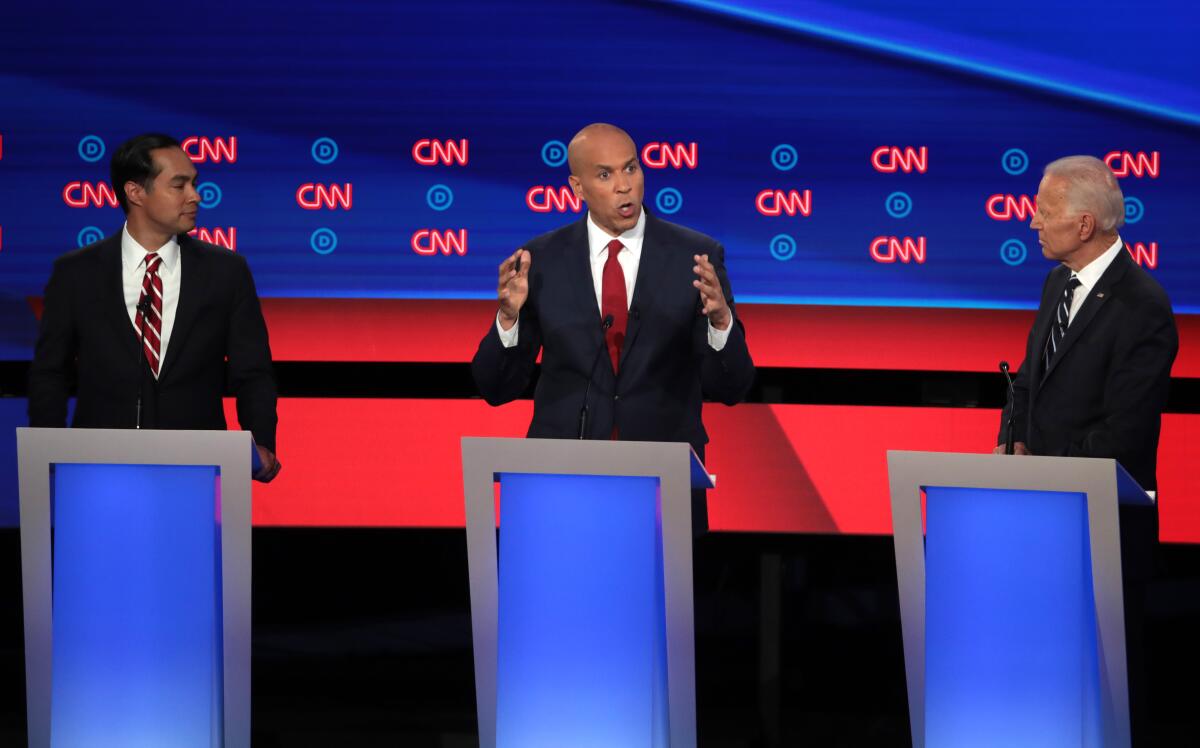
“Congressman Delaney just referred to it as bad policy,” Tapper said. “And previously, he has called the idea ‘political suicide that will just get President Trump reelected.’ What do you say to Congressman Delaney?”
“You’re wrong,” Sanders told Delaney, setting the tone for the rest of the night.
Dwight Grosvenor, a 69-year-old retired United Methodist pastor who attended a recent Harris event in Fort Dodge, said he disliked CNN’s handling of the debate. “The media seems to be pushing them” to fight each other, he said.
Not every Democrat worries that a bruising series of debates will cause the nominee to limp into the general election.
“That’s what primaries are for. People forget all that stuff. Our political memories are so short, it’s pathetic,” said Claire Celsi, a Democratic Iowa state senator. “Think how nasty things got during the Republican primary four years ago. Do we even talk about that stuff anymore? No, we don’t. Occasionally you’ll see an old clip of Rick Perry slamming Trump. But it just fades into the woodwork.”
Celsi, who is choosing between Harris, Castro and Massachusetts Sen. Elizabeth Warren, said she wants the candidates to be more aggressive, not less.
Trav Robertson, chairman of the South Carolina Democratic Party, said quarreling is inevitable in debates, where candidates must distinguish themselves from their rivals.
The field is down to Joe Biden now that Bernie Sanders ended his presidential campaign. Here is the Democrat heading for a battle with President Trump.
“There’s going to be a winner and a loser,” he said. “It’s going to get a lot heavier and harder as we get closer to Super Tuesday.”
The goal of many on stage, Robertson said, is to “define your opponent before you are defined. There are comical ways to do it, there are noncomical ways to do it, and there’s just bare-knuckles fighting.”
He added, “I don’t think we’ve seen the bare knuckles yet.”
Mason reported from Londonderry, N.H., and Pearce from Fort Dodge, Iowa. Times staff writer Mark Z. Barabak contributed to this report.
More to Read
Get the L.A. Times Politics newsletter
Deeply reported insights into legislation, politics and policy from Sacramento, Washington and beyond. In your inbox twice per week.
You may occasionally receive promotional content from the Los Angeles Times.
